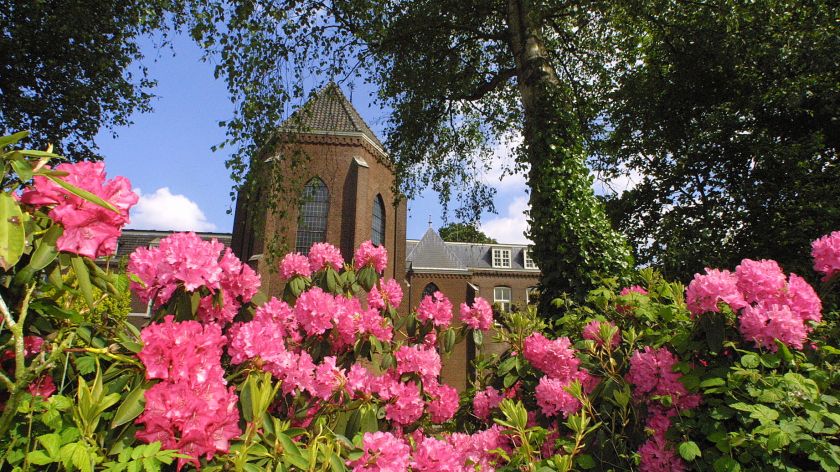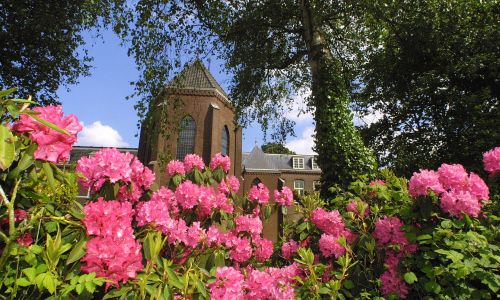Despite interest: ‘Monastery of Soeterbeeck is not for sale’
-
 Klooster Soeterbeeck. Foto: Gerard Verschooten
Klooster Soeterbeeck. Foto: Gerard Verschooten
Two parties have recently shown interest in the monastery of Soeterbeeck in Ravenstein; a monastery that is owned by Radboud University. For the university, selling or renting out the building is out of the question for the moment.
Recently, two parties have shown interest in the monastery of Soeterbeeck. That is confirmed by university spokesperson Martijn Gerritsen following questions by Vox.
‘One party wanted to buy Soeterbeeck, the other was interested in renting it’, Gerritsen says. However, the project developers never came up with a concrete offer. Gerritsen: ‘Soeterbeeck is not for sale.’
Not cost-effective
The monastery of Soeterbeeck, which was gifted to Radboud University in 1997 by Augustinian nuns, now serves as a meeting and conference centre for the university. The centre is used to host training programmes, focus days and other gatherings (see insert below).
‘The energy costs of older buildings like Soeterbeeck are relatively high’
The university’s Facilities & Services are responsible for the operation, maintenance, and management of the Soeterbeeck monastery, in the midst of Brabant’s greenery. This brings about considerable costs, according to the university spokesperson. ‘The energy costs of these older buildings are also relatively high.’
From an economic stance, Soeterbeeck is not cost-effective and that is not expected to change in the future, says Gerritsen. The spokesperson is unable to give exact numbers about the costs and exploitation of Soeterbeeck. ‘We don’t publish data about the exploitation of the monastery.’
Agreements
Johan Oosterman, programme director of Radboud Heritage, recently wondered in Vox what role Soeterbeeck will play in the future of the university. ‘Do we want to keep it as a place of contemplation?’, asked Oosterman, who organised an event to put the monastery in the spotlight.
This question now seems to get an answer. Gerritsen emphasises that Soeterbeecknot only has economic value for the university, but also a cultural-historical value. ‘The building has been gifted and is connected to the origin history of the (previously Catholic, ed.) university.’
It is questionable whether the university could sell Soeterbeeck to a project developer, as the monastery was gifted to the university at the time. ‘Agreements have been made about this’, Gerritsen explains. ‘If the university would want to renounce Soeterbeeck, they would ensure that the new destination is fitting to the character of the building.’
Station Quarter
The interest in Soeterbeeck might be explained by the construction plans of the municipality of Oss around the train station of Ravenstein. The municipality is trying to realise 300 new homes for the elderly, starters and young families.
The impact of the construction plans may be minimal for the monastery of Soeterbeeck, says Ina Kok-Neehoff, chair of the town council Ravenstein. Construction work will take place on the left side of the footpath between the train station of Ravenstein and Soeterbeeck, but not on the right side where Soeterbeeck is located.
‘The land around the monastery is private property and is not included in the land use plan’, says Kok-Neehoff. ‘Soeterbeeck has its own outdoor space’, Gerritsen adds.
However, access will be provided to some of the 300 new homes that will be built near Soeterbeeck. As a result, it might become a bit more crowded around the monastery. In addition, a tunnel will be constructed under the station for cyclists and pedestrians, but it is still unclear whether this will affect the serenity in the former monastery.
Meeting and conference centre Soeterbeeck is frequently rented out to employees of Radboud University and Radboudumc, as well as to external organisations. External reservations are often made by organisations that are linked to Radboudumc or Radboud University, such as CWZ, HAN and Maastricht University; or other organisations near the monastery.
The ratio between internal and external reservations has been relatively stable in the past years. In 2022, 60 per cent of the reservations were made by Radboudumc, 19 per cent by Radboud University and 21 per cent by external organisations.
Translated by Sophie Verhoeven

